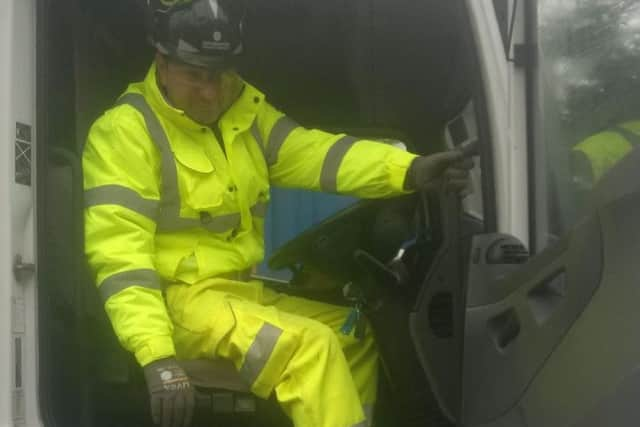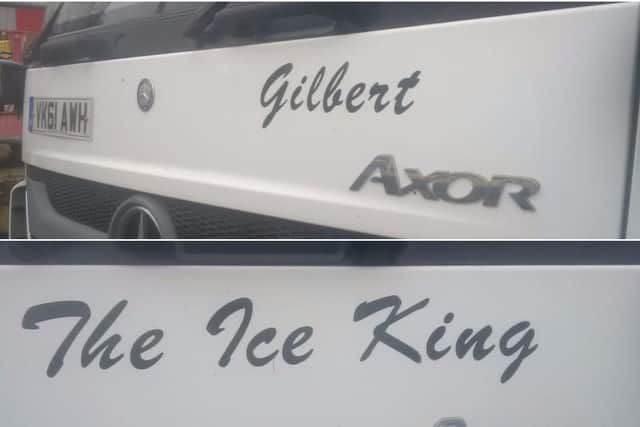Banbury gritter driver shares experiences as Deddington team prepare for winter


Dave Primrose said everyone becomes 'avid weather watchers' as the colder weather approaches as they could be sent out to spray salt on the 1,200 miles of road in the county at any moment.
“There have been occasions when the forecast from the Met Office has changed at short notice and so the call has had to be changed," he said.
Advertisement
Hide AdAdvertisement
Hide Ad"When that means the gritters go out at short notice it can certainly have an impact on your family or social life, but it’s all part of the job.


“My children are grown up now but in my earlier days on the gritters they were still at school and there were occasions they were reminded that their dad was trying to rest and they should be quiet.
Dave, who has been a gritter driver since 2012, usually works as a supervisor organising Oxfordshire County Council's highway maintenance team, fixing potholes and resurfacing roads.
But from November, the 50-year-old father takes on the extra duty along with 24 others of being on stand-by to drive the council's gritter lorries – all with their own names from Ice Warrior to Gritterminator.
Advertisement
Hide AdAdvertisement
Hide Ad“Driving on a freezing cold night in January with the snowplough on at 3am is certainly an experience," he said.


"On the runs that happen at more sociable hours you’ll often get other drivers who get impatient and try to overtake you or race out in front of you.
“During the runs that happen in the small hours you can see see owls, deer, foxes and all kinds of other animals that you wouldn’t encounter during the day.
“There was one memorable evening when I was driving down into Adderbury in the gritter and suddenly there was stag deer right in front of me in the headlights.
"I slammed on the breaks and missed him by a whisker.


Advertisement
Hide AdAdvertisement
Hide Ad“The other thing you can quite often get is people waving at you and asking for a toot on the horn.
"Friday and Saturday nights can be interesting because you can observe people who have very clearly been out for a drink!
“It’s an important job and we know we play a role in helping keep people safe – although of course they play a huge role themselves by driving to the conditions.”
The annual budget for the gritting operation and associated work is just over £1m which is the same as previous winters


Advertisement
Hide AdAdvertisement
Hide AdPaul Wilson, who manages the council’s winter operation, said they make a decision every day on whether the gritters should swing into action or not.
“The crucial determinant that councils check to judge whether the gritters should go out or not is whether the road surface temperature will be at 0.5 degrees or below.
"That’s the temperature at which frost will form and surfaces will become slippery. Many other factors are also taken into consideration by the decision officers.
“Right the way through from November to the spring we take this daily decision.
Advertisement
Hide AdAdvertisement
Hide Ad"Often it is a straightforward judgement but occasionally there are complications.
"For instance, the forecast might be telling us that the night will start very cold and frost will form but it’ll later warm up and that there’ll be rain coming in.


“On other occasions there might be snow in the forecast and we’ll want to time the gritting run just right and perhaps fit the snowploughs to the front of the gritters.
"On such occasions there’s every chance we’d send the gritters out more than once.
Advertisement
Hide AdAdvertisement
Hide Ad“We know it’s a difficult job for a driver of one of the gritters. Driving down a country road in freezing conditions at 2am in dark depths of winter is no picnic."
There is approximately 8500 tonnes of salt in stock which is the same as previous winters and can be stocked up as required as the winter progresses.
Paul said the salt improves the conditions of roads in winter but motorists should take more care.
“The aim is to have the main roads in as safe a condition as possible. It should however be pointed out that gritting is not a magic elixir that prevents the driving hazards that winter brings." he said.
Advertisement
Hide AdAdvertisement
Hide Ad"It lessens them – it does not eliminate them. Our advice is always that people should drive to the conditions.
"Don’t drive in December like you would in June or July. It’s common sense really - but it’s important.”